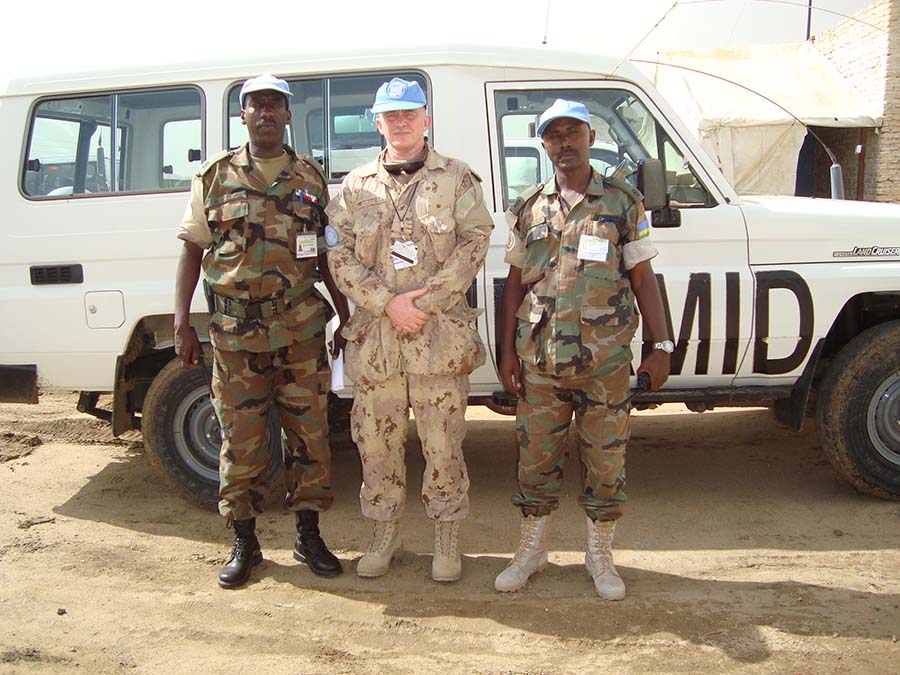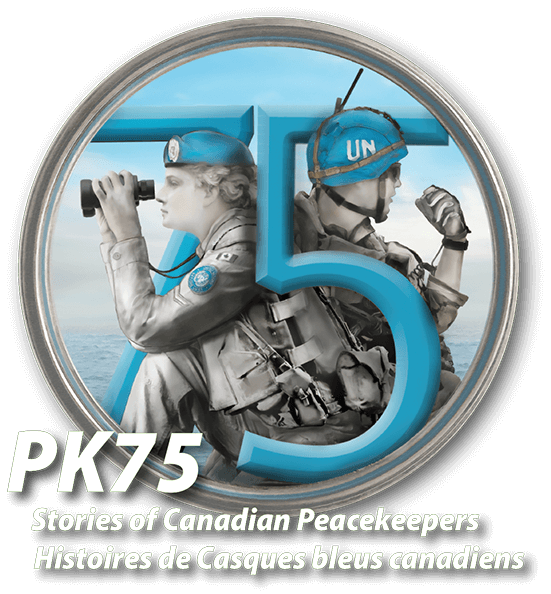

Glace Bay, NS, Canada
Dr. Ian MacVicar
Current Location: Hammonds Plains, NS, Canada
Like many Canadians growing up in the 1960s and 1970s, I believed that Canada was “the” world leader in peacekeeping, and anticipated that, like previous generations, I would patrol the Green Line in Cyprus as a member of a regiment. My experience was much different, as I was the only Canadian, i.e. a “one-off,” on most of my peacekeeping/peace support missions. This circumstance can leave you feeling quite exposed.
I was a Senior Military Liaison Officer in the UN-African Union Mission in Darfur 2008–2009. I was on a 190 km patrol with a nation that will remain nameless, driving from El Fashir, North Darfur to Nyala, South Darfur. I asked the company commander how they navigated in such terrain, figuring someone had a map — as he did not. He replied that none of the 20 armoured and soft-skinned vehicles had a map or a GPS, but that the driver of the lead APC had made the same trip a week ago. He knew to drive due west until he saw a solitary tree, and then to turn left and to drive south for 100 kilometres until there was another tree. Shocked, I timed our trip, noted the position of the sun, and watched the odometer over the driver’s shoulder. This patrol became, as Rabbit said to Winnie the Pooh, “A long explore.”
We got stuck in a muddy wadi after two hours. We then changed course by 90 degrees — and got lost after 15 minutes. The Company commander and his second-in-command were in a quandary. As I had been watching my watch and the odometer, I did a little “dead reckoning” to send them back along their original path, turning 90 degrees south at the tree where they had last turned west. “How did you do that?’ asked the company commander. I explained that I had timed the speed for 16 minutes at 40 kph and I knew that we had made a 90-degree turn from the initial direction of travel. I asked him what training his soldiers had in navigation. “The best,” he replied, “they are members of our Special Forces and the Presidential Guard.” My jaw dropped. On the way back from Nyala we saw a couple of huts burning approximately 250–300 meters away. I asked the company commander to investigate. He refused to do so, saying that it was not his mandate to interfere. I was dumbfounded. “Weren’t we there as peacekeepers?” Apparently not.
I participated in the first Organization for Security and Cooperation in Europe Arms Control Verification mission in May 1996. We were investigating reports of Dayton Accord violations on a mountain top near Zenica, Boznia-Herzegovina, i.e. a belligerent had deployed a Ground Surveillance Radar. I had to photograph the violation. Although we ensured that the National Escort Team leader was not in my vicinity, he saw me take the photo. Within seconds I was held at gunpoint as he yelled “Spion” (Spy)! Your senses become hyper-alert in these circumstances. I saw six tiny black hairs sticking out of a small brown mole on his chin from three metres away. My first thoughts were “We got this, what an ugly f***er.” As I saw his pupils dilate, he started to squeeze the trigger. This became “Think good thoughts” as they could be my last — and I pictured my three-week old daughter. Obviously, someone intervened.
Two days later I was seated between two Serb officers in our van in the market square of Novi Travnik. The other team members were delayed. A crowd gathered around the van, including numerous armed men. The van was rocked back and forth by the crowd as they yelled “Chetnik” (Serb). I thought “A bullet that gets either one gets me too.” My senses focused on the red Converse sneakers worn by one of the irregular AK-47 toting soldiers in the crowd. Whistles blew as police beat a path through the crowd with truncheons, sparing only an elderly woman with a string shopping bag.
Years later, I recounted these incidents during an Eye Movement Desensitization Reprocessing treatment for PTSD. I screamed, then sobbed, “I’ve waited 22 years to let out that scream.”
Biography
Lieutenant-Colonel Dr. Ian MacVicar (Retired) is the Director and Principal Analyst of Ian MacVicar Universal Security Intelligence Cognitive Solutions (I-MUSICS) Consulting, Inc., which hosts 16 consultants from across Canada with military, police, business, legal, and healthcare backgrounds.
MacVicar served in the Canadian Armed Forces for 42 years. His last Regular Force post was as Assistant Chief of Staff and J3 of Joint Task Force Atlantic. His last Reserve post was Senior Reserve Advisor (Operations & Training) in 5th Canadian Division where he contributed to exercise design, validation, and doctrine training. Of note, he served five years in J3 Arms Control Verification, employed as a Russian interpreter, photographer, Team Deputy, and Team Leader of multi-national, on-site verification teams. He participated in over 50 on-site inspections of military forces of the former Warsaw Pact and of each of the belligerents in the Former Yugoslavia.
MacVicar served in a wide variety of Army and joint command and staff positions, including as Commanding Officer (CO) of the Disaster Assistance Response Team Company in Honduras, as CO of the Joint Nuclear Biological Chemical Defence Company (now Canadian Joint Incident Response Unit — CBRN), as Director CBRN Defence, as Battery Commander E Battery, and as Acting 2IC of 2nd Regiment Royal Canadian Horse Artillery. He served with 1st Regiment Royal Canadian Horse Artillery in Lahr, Germany in the late 1980s.
MacVicar served almost two years in eastern Africa with the United Nations African Union Mission in Darfur (UNAMID) and with the U.S. led Combined Joint Task Force-Horn of Africa. He is a graduate of the 2017 Dalhousie University/Veteran Trainers to Eradicate the Use of Child Soldiers program under the auspices of the Roméo Dallaire Child Soldiers Initiative.
Dr. MacVicar is the principal writer for doctrine revisions for the Canadian Army Tactics School Combat Team Commander’s Handbook revision project under the auspices of a Calian Group, Ltd. multi-year contract. He is a Royal United Services Institute Nova Scotia Research Fellow, where he specializes in intelligence and veteran’s health issues. His 2015 doctoral dissertation, entitled Applying Foresight: On Anticipating Unintended Consequences in Internal Security, examined internal security law and executive measures in Canada, the United Kingdom, and the United States between 1914 and 2015. Dr. MacVicar has presented his research on cognitive traps (i.e. distorted thinking) in security planning at conferences in the United Kingdom and Canada.
His popular Seniors’ College Association of Nova Scotia (SCANS) courses include Spy School 101 and 201, which address the history of intelligence, espionage, and associated legal oversight regimes; and Spy School 301, which addresses the psychology of intelligence. Dr. MacVicar advises on developing psychological resilience in government and business audiences, drawing on his academic training, operational experience, and practical qualifications as a Trauma Informed Yoga Teacher (CYT, TIYT).
Dr. MacVicar has published articles on leadership, human security, the Responsibility to Protect (R2P) doctrine, and the psychological challenges facing the non-combatant women and children of the former Islamic State. He has two book chapters and several articles in pre-publication concerning intelligence history, the psychology of intelligence analysis, and child soldier intelligence in Canada and in the United Kingdom. His current research focuses on the psycho-social challenges in reintegrating ISIS family members in their countries of origin.
Dr. MacVicar’s professional associations include the Association of Canadian Chemical Biological Radiological Nuclear Explosives Technicians and the Canadian Military Intelligence Association, where he is the Director of Academic Outreach for CMIA Halifax Chapter. He is a Life Member of the Canadian Armed Forces Dragon Soldier Society, the U.S. National Honor Society Omicron Sigma Sigma Order of the Sword & Shield, Delta Epsilon Tau International Honor Society, and the International Association For Intelligence Education, where he is on the planning board for the activation of a IAFIE-Canada Chapter. He is also a member of Trauma Informed Yoga Therapy (Canada).

MacVicar with Rwandan company commander and his Sergeant Major before setting out on a night patrol.



